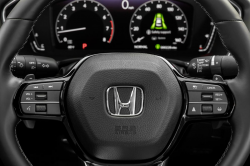
—
A Honda class action lawsuit alleges sticky steering is caused by defective electric power steering systems that have caused crashes and other problems.
The first Honda sticky steering lawsuit included only Civic vehicles, and it was filed just days after the National Highway Traffic Safety Administration opened an investigation into complaints about sticky steering wheels in Honda Civics.
The class action alleges Honda knew about steering problems before the vehicles were first sold but still sold them to make money from consumers.
As with numerous automotive class action lawsuits, once one is filed more will follow, and the Honda sticky steering lawsuit is no exception. Three class actions were consolidated into one:
The Honda class action lawsuit includes these models:
- 2022-2024 Honda Civic
- 2022-2024 Honda Civic SI
- 2023-2024 Honda CR-V
- 2023-2024 Honda HR-V
- 2023-2024 Acura Integra
Honda Sticky Steering Investigation and Recall
NHTSA opened the initial Honda Civic sticky steering investigation in March 2023, leading to the first Honda class action lawsuit. The federal investigation was later upgraded to include sticky steering wheels in 2022-2023 Honda Civic, 2023 Honda CR-V and 2023 Acura Integra vehicles.
In October 2024, Honda recalled about 1.7 million of the vehicles in the U.S. to repair the sticky steering problems. Customers were sent recall letters in November 2024 and all 1.7 million Honda vehicles would be equipped with new steering worm wheel gear springs with decreased loads.
Dealerships would also add grease and relocate any grease sitting on top of the worm wheels back into the meshing areas.
NHTSA closed its Honda sticky steering investigation based on Honda’s recall repairs.
Motion to Dismiss the Honda Sticky Steering Lawsuit
Honda argues the class action lawsuit should be dismissed because the allegations don’t meet legal requirements for the lawsuit to continue.
Honda references the plaintiff’s claim that Honda “has known …or should have known” of the sticky steering defect before the plaintiffs purchased their vehicles. Honda alleges the claims are nothing more than “boilerplate allegations” made in all automotive lawsuits.
The plaintiffs contend Honda had presale knowledge of steering problems, but Honda argues the “allegations make clear any such knowledge post-dates all or nearly all of Plaintiffs’ vehicle purchases.”
The plaintiffs assert Honda must have known about sticky steering based on customer complaints about the problem. But Honda says very few of those complaints mention problems before late 2022.
As for the March 2023 federal investigation proving Honda knew of problems, the automaker argues that was after all the plaintiffs except two purchased their vehicles.
Honda also told the judge claims of violating California’s Song-Beverly Act should be dismissed for the non-California plaintiffs because the Act “applies only to vehicles sold in California.”
Honda also reminds the judge of how the sticky steering lawsuit has already had certain fraud claims dismissed, but the plaintiffs apparently try to plead new fraud by concealment claims. According to Honda, that plan won’t work because the judge has already dismissed those claims, “without leave to amend.”
Honda told the judge to survive a motion to dismiss, the plaintiffs must allege facts plausibly establishing Honda was aware of the sticky steering problems at the time the vehicles were sold. But Honda argues the plaintiffs have failed to do that.
The Honda sticky steering lawsuit was filed in the U.S. District Court for the Central District of California: Burgos, et al., v. American Honda Motor Company, Inc.
The plaintiffs are represented by Hagens Berman Sobol Shapiro LLP, Greenstone Law APC, Glancy Prongay & Murray LLP, and Casey Gerry Schenk Francavilla Blatt & Penfield, LLP.

